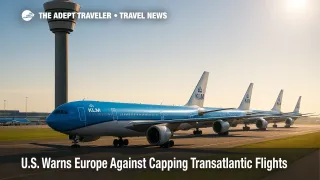U.S. warns Europe against capping transatlantic flights

The United States is pushing back on proposals that could curb transatlantic flights, with Transportation Secretary Sean Duffy warning European governments not to impose unilateral limits that conflict with open skies agreements. Speaking at the ICAO assembly in Montréal, Duffy cited recent debates around Amsterdam Schiphol and Dublin and said Washington would respond if capacity cuts undermine treaty obligations. He also signaled potential action on Mexico if long-running U.S. concerns are not addressed.
Key points
- Why it matters: Transatlantic flights are a backbone for trade, tourism, and business connectivity.
- Travel impact: Caps at major hubs could mean fewer frequencies, higher fares, and tighter award availability.
- What's next: ICAO discussions continue, while Dutch and Irish constraints face courts, planning, and political review.
- Schiphol context: A floated reduction from 500,000 to about 460,000 flights sparked industry and diplomatic pushback.
- Dublin context: A 32-million passenger cap remains suspended pending legal and governmental steps.
Snapshot
At issue are moves in Europe to manage noise and emissions by limiting airport activity. Amsterdam Airport Schiphol (AMS) previously examined reducing annual flights, while Dublin Airport (DUB) has operated under a legacy passenger cap now tied up in litigation and policy debate. Duffy told reporters the United States would "enforce international aviation agreements" if partners curtail access, framing airport caps as inconsistent with open skies. He also criticized efforts to tax or restrain premium air travel at ICAO, arguing they stray from safety and efficiency priorities. For travelers, capacity reductions at hubs like AMS or DUB could translate into fewer nonstop options, thinner schedules, and more pressure on fares across peak seasons. Related network constraints in Europe compound the stakes, as delays and slot scarcity already strain summer operations. For broader context, see our analysis of European summer flight delays and airfare trends for 2025.
Background
The Schiphol discussion began in 2023, when Dutch authorities explored lowering flights to mitigate noise and climate impacts. Proposals ranged near 440,000 to 460,000 annual movements, down from 500,000, triggering legal and diplomatic challenges. Courts issued mixed rulings, and the government later paused aspects of the plan. In Ireland, Dublin's cap of 32 million passengers, set when the second terminal was approved, became binding as traffic rebounded, prompting disputes over growth, planning permissions, and environmental conditions. The High Court has kept enforcement of the cap on hold during legal review. At the global level, ICAO's triennial assembly has become a forum where the United States is resisting measures it views as de-facto traffic restrictions or revenue schemes targeted at long-haul travel.
Latest developments
Duffy links airport caps to open skies obligations
Duffy warned on September 24 that unilateral European caps on transatlantic flights would draw a U.S. response, underscoring treaty rights for fair and equal opportunity to compete. He referenced recent capacity debates at Schiphol and Dublin and flagged Lisbon among other areas of concern. Reuters reporting from the ICAO assembly also captured U.S. objections to proposals that shift ICAO's focus toward climate and social goals at the expense of core safety and efficiency, along with U.S. opposition to new taxes targeting premium air travel. Separately, the department has put Mexico on notice that new route requests could be disapproved if bilateral concerns around competition and cargo handling at Mexico City are not resolved, signaling a broader willingness to use aviation levers to defend market access.
Analysis
For travelers, the headline risk is a structurally smaller transatlantic schedule if airport caps advance. Even modest percentage cuts at a hub like Amsterdam can ripple across alliance banks, reducing frequency choice at peak times and eroding connectivity to secondary European cities. With Europe's network already operating close to its throughput ceiling in summer, any slot withdrawal magnifies delay sensitivity and pushes airlines to consolidate departures into fewer, fuller waves. Pricing tends to firm when frequencies fall, particularly on business-heavy routes and seasonal leisure trunk lines where wide-body availability is tight. On the policy front, open skies agreements generally guarantee nondiscriminatory access and competitive opportunity. Moves framed as environmental protections must still align with treaty commitments, or they risk state-to-state disputes and retaliatory measures. The U.S. posture at ICAO indicates a harder line: oppose capacity-reducing schemes, defend connectivity, and resist fiscal measures that could indirectly suppress premium demand that underwrites long-haul economics. Expect airlines to lobby hard at national and EU levels while diversifying gateways to hedge against single-airport constraints.
Final thoughts
Watch three tracks: court and policy outcomes in the Netherlands and Ireland, ICAO deliberations influencing future guidance, and any U.S. bilateral steps with Mexico. Until there is clarity, carriers will protect core banks and yields on North Atlantic corridors, and travelers may see fewer marginal frequencies and tighter award space. If caps advance, rebookable tickets, alternative hubs, and flexibility on travel days will matter more. The balance between environmental goals and market access will define the next chapter for transatlantic flights.
Sources
- Transportation chief warns Europe not to restrict transatlantic flights, Reuters
- U.S. criticizes climate, social focus of UN aviation group, Reuters
- U.S. threatens Mexican flights over cargo, competition issues, Reuters
- Schiphol flights to be limited to 460,000 a year, Reuters
- Dutch government suspends plan to cut flights at Schiphol, Reuters
- Irish court extends suspension of seat cap at Dublin Airport, Reuters
- Remove the passenger cap at Dublin Airport, Dublin Airport
